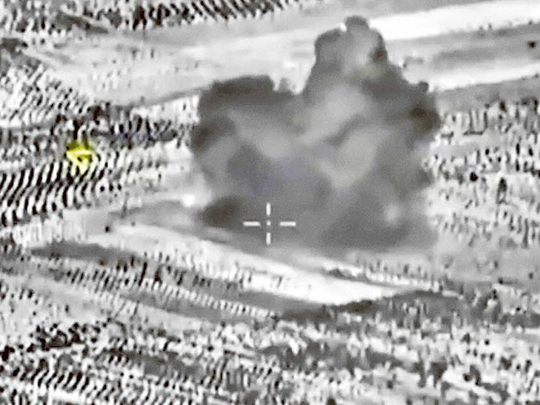
Washington: The already fragmented battlefield in Syria grew even more complicated Friday, as Russia and Iran expanded their military efforts to defend the beleaguered Syrian government in defiance of President Barack Obama, who predicted that their actions would only lead to a “quagmire.”
In his first comments since Russia began air strikes on Syrian targets this week, Obama said that Moscow was acting “not out of strength but out of weakness.” Bristling at criticism of his own Syria policy, he rejected domestic opponents who offer “half-baked ideas” that amount to “a bunch of mumbo-jumbo.”
“An attempt by Russia and Iran to prop up Al Assad and try to pacify the population is just going to get them stuck in a quagmire and it won’t work,” Obama said during a news conference at the White House on Friday, referring to President Bashar Al Assad of Syria, a longtime ally of both Russia and Iran. “And they will be there for a while if they don’t take a different course.”
Neither Russia nor Iran showed signs of listening. While Moscow widened its air strikes to hit Daesh territory for the first time, Russian troops have unloaded a major long-range artillery system to add more firepower to its deployment in Syria, according to a US official. At the same time, US officials said Iran had sent as many as 600 additional ground troops to bolster Al Assad’s government.
Obama was left to confront a deteriorating situation over which he seemed to have even less control than before. In New York, Secretary of State John Kerry met separately with the foreign ministers of Russia and Iran without any apparent breakthrough, while US allies from Europe and the Middle East publicly called on Russia to stop bombing the moderate Syrian opposition to Al Assad.
The president said that his program to select, train and arm Syrian rebels to fight the Daesh group had failed in part because he had insisted they only battle the militants - and not also focus on toppling Al Assad’s government.
“I’m the first one to acknowledge it has not worked the way it was supposed to,” Obama said.
Instead, he said the United States wanted to work more closely with Kurdish allies who have enjoyed some success against the Daesh to see “if we can build on that.” But he repeated his conclusion that there was no military solution to the long-running fratricidal war, only a political settlement that has to end with Al Assad’s departure from power.
“The problem here is Al Assad and the brutality he’s inflicted on the Syrian people,” Obama said. While the United States will work with “all parties” to broker a transition, he said, “we are not going to cooperate with a Russian campaign to simply try to destroy anybody who is disgusted and fed up with Mr. Al Assad’s behavior.”
Russia widened its bombings Friday, saying its warplanes struck seven targets, including a command post and training camp near Raqqa, the northeast Syrian city that the Daesh has converted into the capital of its self-proclaimed caliphate straddling Syria and Iraq. Until now, Russia had hit territory that was not dominated by the Daesh but, in some cases, where US-supported rebels were located.
Russia seemed intent on adding more capacity with the delivery of a potent rocket system called Smerch. US intelligence analysts also have detected Russian military advisers pushing east to Hama, erecting tents at the Hama equestrian club, although the purpose remained unclear.
Similarly, Iran was reinforcing its own presence in Syria. US officials said 300 to 600 Iranian troops had arrived in recent days, augmenting some 1,500 who have been in Syria for months along with more than 5,000 militia fighters from Hezbollah, the Lebanese Shiite group allied with Iran, which has played an increasingly important role defending government territory.
Western diplomats at the United Nations expressed concern that the Russian strikes will only embolden Al Assad, making any political settlement more difficult. For Arab allies in particular, one such diplomat said, it would be impossible to enter into political talks without resolving that Al Assad would leave after a transitional government.
“It’s very important we don’t leave this question mark open,” said the diplomat, who spoke on the condition of anonymity to address closed-door discussions.
Some of those regional allies joined the United States and Europe in Friday’s statement condemning Russian actions and urging Moscow to focus any strikes on the Daesh.
“These military actions constitute a further escalation and will only fuel more extremism and radicalisation,” said the statement, signed by the United States, France, Germany, Britain, Qatar, Saudi Arabia and Turkey.
Kerry met with Foreign Minister Sergey V. Lavrov of Russia and Foreign Minister Mohammad Javad Zarif of Iran, who were in New York for the UN meeting, but aides said the Zarif meeting focused on the recent nuclear agreement, not Syria. Kerry also met with Yousuf Bin Alawi, the foreign minister of Oman, which was a central intermediary with Iran leading to the nuclear deal.
Syria welcomed Russia’s help on Friday. Foreign Minister Walid Al Moallem, addressing the UN General Assembly, said the Russian operations were part of an effort to fight terrorism and he ridiculed Western advocacy for political changes during such a battle.
“Syria cannot implement any democratic political measures related to elections, a constitution or the like while terrorism is striking at home and threatens innocent civilians in the country,” he said. He castigated the West and Arab states for failing to stop the influx of foreign jihadis into Syria, blaming the alliance for creating the crisis.











